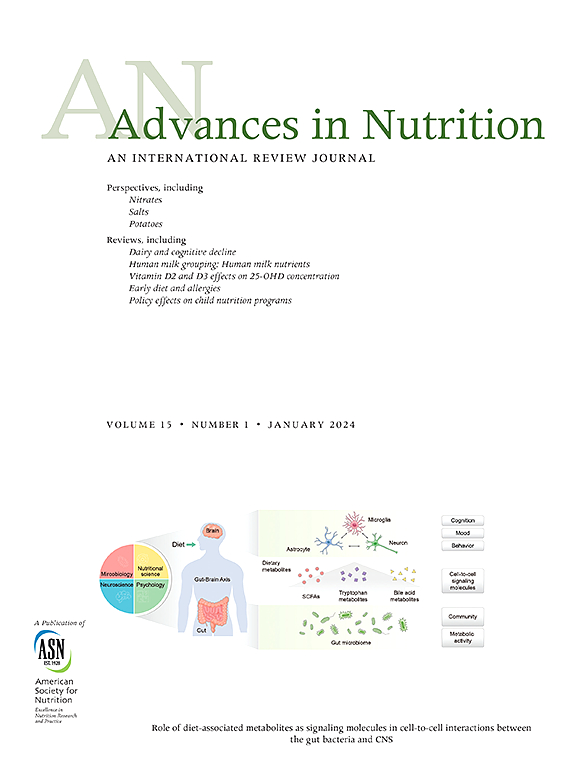Perspective: Biomarkers of Aging in Human Nutrition Research—A Focus on Applications, Challenges, and Opportunities
IF 9.2
1区 医学
Q1 NUTRITION & DIETETICS
引用次数: 0
Abstract
Predictive algorithm-based biomarkers of aging (BoA), such as aging clocks, are increasingly applied within human nutrition research. Despite great promise of these BoA, validation efforts and guidelines for implementation are lagging behind the vast and growing number of available biomarkers, complicating their use and introducing variance across studies. Therefore, in the current perspective paper, we provide practical insights and an initial set of recommendations for consistent future implementation of BoA within nutrition research based on current knowledge, both on a general level and within different research scenarios. We critically reflect on existing observational and experimental nutrition research, and outline the potential application of BoA in identifying at-risk groups, exploring heterogeneity underlying aging and nutritional effects, and personalized approaches. This work aims to support nutritional researchers in making informed decisions on contextually appropriate biomarkers and provides directions for future nutritional research involving BoA, because, despite much needed advancements, we consider BoA exciting and promising tools in nutrition research.
展望:生物标志物在人类营养研究中的应用、挑战和机遇。
基于预测算法的衰老生物标志物(BoA),如衰老时钟,越来越多地应用于人类营养研究。尽管这些BoA有很大的前景,但验证工作和实施指南落后于大量和不断增长的可用生物标志物,使它们的使用复杂化,并在研究中引入了差异。因此,在当前的前瞻性文章中,我们根据现有的知识,在一般水平和不同的研究方案中,为营养研究中一致的未来实施BoA提供了实用的见解和初步建议。我们批判性地反思了现有的观察性和实验性营养研究,并概述了BoA在识别高危人群、探索衰老和营养效应的异质性以及个性化方法方面的潜在应用。这项工作旨在支持营养研究人员在适当的生物标志物上做出明智的决定,并为未来涉及BoA的营养研究提供方向,因为尽管还需要很多进展,我们认为BoA是营养研究中令人兴奋和有前途的工具。
本文章由计算机程序翻译,如有差异,请以英文原文为准。
求助全文
约1分钟内获得全文
求助全文
来源期刊

Advances in Nutrition
医学-营养学
CiteScore
17.40
自引率
2.20%
发文量
117
审稿时长
56 days
期刊介绍:
Advances in Nutrition (AN/Adv Nutr) publishes focused reviews on pivotal findings and recent research across all domains relevant to nutritional scientists and biomedical researchers. This encompasses nutrition-related research spanning biochemical, molecular, and genetic studies using experimental animal models, domestic animals, and human subjects. The journal also emphasizes clinical nutrition, epidemiology and public health, and nutrition education. Review articles concentrate on recent progress rather than broad historical developments.
In addition to review articles, AN includes Perspectives, Letters to the Editor, and supplements. Supplement proposals require pre-approval by the editor before submission. The journal features reports and position papers from the American Society for Nutrition, summaries of major government and foundation reports, and Nutrient Information briefs providing crucial details about dietary requirements, food sources, deficiencies, and other essential nutrient information. All submissions with scientific content undergo peer review by the Editors or their designees prior to acceptance for publication.
 求助内容:
求助内容: 应助结果提醒方式:
应助结果提醒方式:


